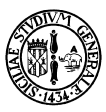The University of Catania was founded in 1434, when the king of Spain and Sicily, Alfonso of Aragon, and Pope Eugene IV gave their authorisation. Today the university buildings are spread throughout the city, with a contrast between the modern, hi-tech university city and numerous historical buildings in the old city centre. The University of Catania offers a portfolio of academic titles and is engaged in creating a "laboratory" in which the ancient knowledge of the Mediterranean culture meets the new technologies to offer an original and advanced training experience. The University of Catania has 18 departments and three schools, with 89 “corsi di laurea triennali” and 91 “corsi di laurea specialistica”, and 93 PhD programmes in the fields of agriculture, architecture, economy, education science, engineering, foreign languages, law, literature and philosophy, medicine, pharmacy, political science, and mathematical, physical and natural sciences. The university is particularly strong in the fields of physics (especially theoretical, nuclear and astro- physics), chemistry (with special reference to biochemistry and industrial chemistry), medicine (above all cardiology, paediatrics, oncology, endocrinology, surgery), agriculture (especially for sustainability in Mediterranean crops and natural resources management), geology (mainly vulcanology, of course). Particularly well regarded are the groups operating in the department of engineering, which offers education in nearly all fields of specialisation, especially computer science, civil engineering, electronic and mechanics. As for human and social sciences, the University of Catania is strong in law, and historical and archaeological studies are also well developed, with active international co-operations. Last but not least, the department of economics and business offers specialisation in the fields of international business and trades, enterprise management and co-operation policies.



